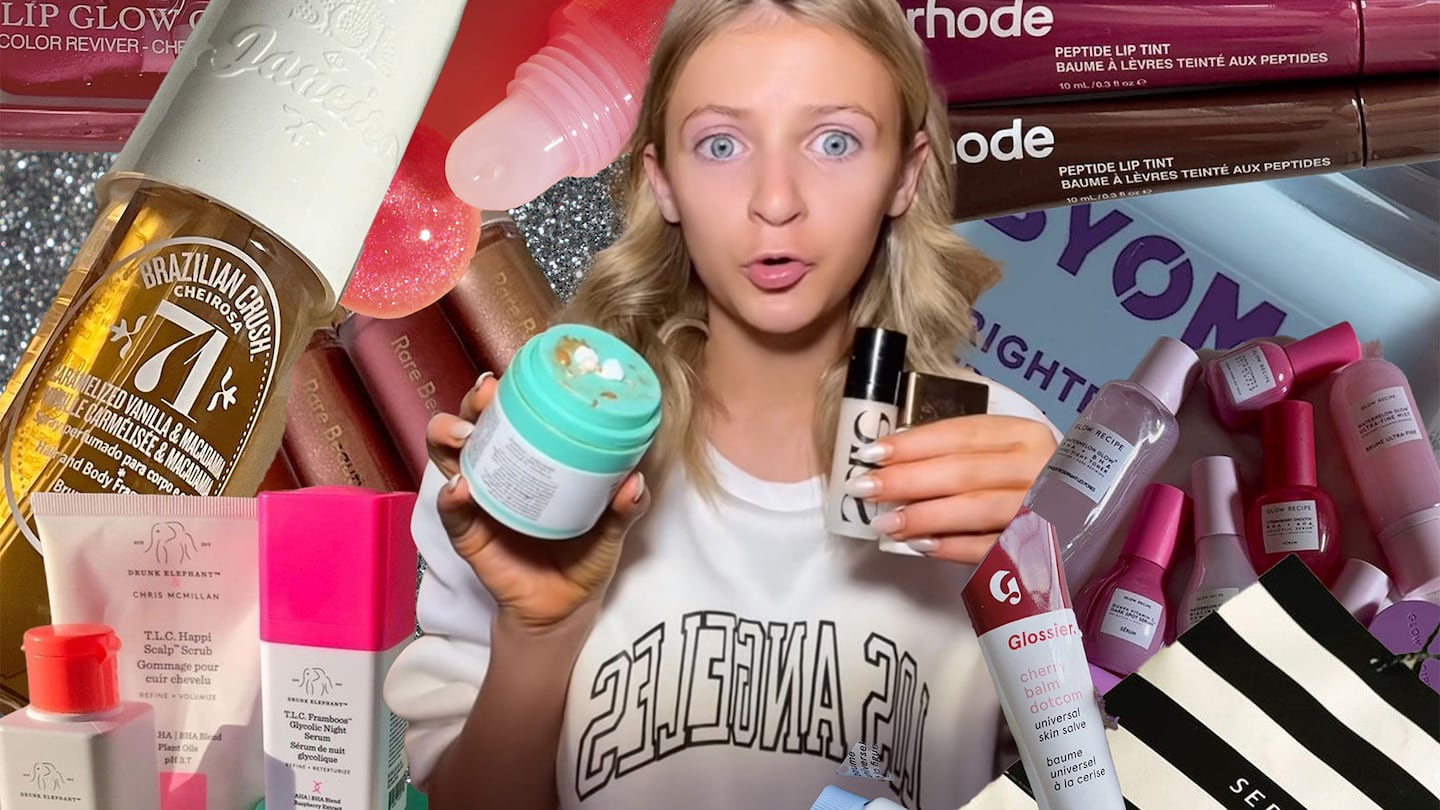
The Business of Fashion
Agenda-setting intelligence, analysis and advice for the global fashion community.

Agenda-setting intelligence, analysis and advice for the global fashion community.

Connecticut-based middle-schooler Josie Bickerton is only 13 years old, but she already has a 13-step beauty routine.
After cleansing, she goes in with a Glow Recipe toner, followed by the brand’s Watermelon Glow Ultra Facial Mist. She then layers on Glow Recipe Dew Drops and Drunk Elephant’s Protini Polypeptide Firming Moisturiser. To add shimmer and shine, she adds Saie’s Glowy Super Gel. She finishes off her routine with makeup. Her current obsessions are Rare Beauty’s liquid blush which she mixes with Charlotte Tilbury’s Pillow Talk Cream Blush and Iconic London’s Ultimate Bronzing Powder. She finishes her look with mascara from Iconic London.
“Everyone is into skincare and I want to have a routine, too,” said Bickerton. “I’m trying out [all of these products] to understand what works for me and what I like.”
Bickerton is hardly the only tween obsessed with beauty. Thanks to the proliferation of dermatologists and skincare experts who preach the importance of ingredients on TikTok, Gen Alpha — commonly defined as those born between the years 2010 and 2024 — is already full of educated beauty consumers. According to investment bank Piper Sandler’s semi-annual “Taking Stock with Teens Survey,” beauty spending among teens increased 23 percent year-over-year in 2023, fuelled in part by cosmetics purchases. (Piper Sandler does not yet track the consumer habits of Gen Alpha, but the survey’s average respondent was 15.7 years old.)
ADVERTISEMENT
Historically, mass brands like Clearasil and Neutrogena and at the higher end, Clinique, dominated the tween skin segment, with few options in between. But in recent years, there’s been a number of new entrants to the market hoping to revitalise the sector by speaking directly to tweens and focussing on their specific skin issues.
“While there are many options for skincare products over $30, when you look at the price point of $20 or less, people are still stuck with the same old school stuff that I used when I was a teen and that my mom used when she was a teen,” said Shai Eisenman, founder and chief executive of youth-centric skincare label Bubble.
In connecting with Gen Alpha, even beauty brands with a core Millennial or Gen Z clientele and a higher price point can start building brand loyalty that could pay dividends for decades. So far, those that are succeeding — such as skincare labels Byoma, Peace Out and Drunk Elephant — have a strong wholesale presence as well as approachable marketing and fun, bright packaging.
“This consumer is incredibly brand agnostic and product-driven,” said Larissa Jensen, beauty industry advisor at market research firm Circana. “They are interested in discovering new and efficacious products and that’s a great spot to be if you’re a brand looking to widen your target audience.”
While the Gen Alpha consumer discovers beauty brands online — usually on TikTok — without their own credit cards, they tend to shop in stores. With that, labels hoping to court this consumer ought to have a robust wholesale distribution strategy.
Kristen Miller, a New York-based dermatologist and mother of 11-year-old Vivien, said her daughter does not yet have social media, but still wants to spend her weekends at Sephora and Bluemercury.
“Skincare is what kids her age talk about, even those without social media,” Miller said. “This information percolates and you start finding kids hanging out at Sephora even when they aren’t buying anything. They just want to look at it.”
In store, bright and colourful packaging helps brands stand out to Gen Alpha buyers on shelves. Byoma, a skincare label whose expertise is rebuilding the skin barrier, has packaging that resembles brightly-coloured building blocks, similar to Legos.
ADVERTISEMENT
While Gen-Z’s skincare purchases are motivated by education, Gen Alpha’s shopping habits are motivated by “the gamification of skincare,” where consumers shop products not because of their efficacy, but for their aesthetic appeal, said Marc Elrick, Byoma’s founder and chief executive.
“The rise of the ‘shelfie,’ a photo of what’s in your bathroom shelf, has been a game changer for our brand,” said Elrick, who launched Byoma in 2022. “This demographic is collecting skincare and it helps if your brand is aesthetically pleasing and fun.”
And while tween shoppers have long bought their skin products at drug stores, Gen Alpha is overwhelmingly shopping at prestige beauty retailers. According to data from Circana, prestige beauty sales grew by 13 percent in 2023 compared to 2022, while mass beauty sales increased by 1 percent in the same period. And while a $98 Drunk Elephant moisturiser might seem out of reach for middle school-aged buyers, consumers like Vivien and Josie Bickerton are using their allowance or babysitting earnings to make purchases — or buying mini versions of their favourite products.
“What’s kind of genius about what [prestige beauty] has done is they now have a lot of minis that come in little gift bags, which allow these kids to sample a bunch of different things at once without buying full size,” said Knoll. “At a lot of birthday parties, kids are giving each other beauty products.”
Bickerton recently celebrated her 13th birthday and asked for Sephora gift cards in lieu of tangible presents.
“I want to get a few things from Charlotte Tilbury, Sol de Janeiro and Kosas,” she said.
As Gen Alpha experiments with prestige skincare, they’re also reaching for products that are typically marketed towards an older demographic.
“My patients are coming in with skin irritations and rashes because they are using niacinamide and retinol, which is meant for adults,” Dr. Brooke Jeffy, an Arizona-based dermatologist specialising in teen skin. “Skincare is so overexposed on platforms like TikTok that it is confusing my patients by recommending products that aren’t meant for them.”
ADVERTISEMENT
Although Vivien doesn’t yet have social media, Kristen still says controlling what products her daughter has access to is difficult due to the sheer prevalence of skincare among young people these days, from TikTok to Sephora to school hallways.
“It became a really popular thing at my school,” said Vivien of shopping for skincare. “When my friends and I go into town, we might stop at a Sephora and they’ll tell me about a product I haven’t heard about yet that they have used.”
Brands are divided on whether they bear any responsibility for educating consumers on what is and isn’t meant for tween skin. Peace Out’s founders are considering adding a disclaimer to products that aren’t suitable for children. Others don’t believe it is their place to tell their consumers what and what not to purchase.
“I think that’s a parent thing. We’re not going to start to try to get into a dialogue with children about acids and retinol,” said Tiffany Masterson, founder of Drunk Elephant. “It’s like going to a restaurant with alcohol on the menu, parents decide whether or not that’s appropriate for their kid.”
But unlike alcohol, industry-wide regulations of the skincare category, especially concerning younger consumers, remain to be seen. The European Union Commission has set to limit the concentration of retinol in over-the-counter products to address side effects of overexposure. This law will likely impact international product offerings.
“Brands haven’t had to think of age restrictions but because this generation is so young and so knowledgeable, it is something to consider,” said Junior Scott Pence, Peace Out’s co-founder and chief marketing officer. “They are still growing their skin barrier and we don’t want to cause harm.”
Once seen as a last-minute impulse purchase, bite-sized products are becoming a main attraction for prestige brands and retailers looking to widen their customer base.
The oldest members of the youngest generation turn 13 this year. Like Gen-Zers and millennials before them, they’re already being defined by a fresh set of beliefs, aesthetics and attitudes.
Charlotte Palermino, a leading ‘skinfluencer’ and co-founder of decidedly not clean skin care brand Dieux, is using her platform to shift the conversation around “clean beauty.”

Yola Mzizi is the Editorial Apprentice at The Business of Fashion (BoF). She is based in New York and provides operational support to the New York team and writes features for BoF and The Business of Beauty.
Brands say they’re barreling ahead with marketing and commerce on the app, even as the clock starts ticking for owner ByteDance to sell it or shut it down.
The Spanish beauty and fashion conglomerate’s smart acquisitions and diverse portfolio could be a big draw for investors. Plus, Adidas is set to confirm its stellar first quarter.
How not to look tired? Make money.
In a rare video this week, the mega-singer responded to sceptics and gave the public a look at what her beauty founder personality might be.